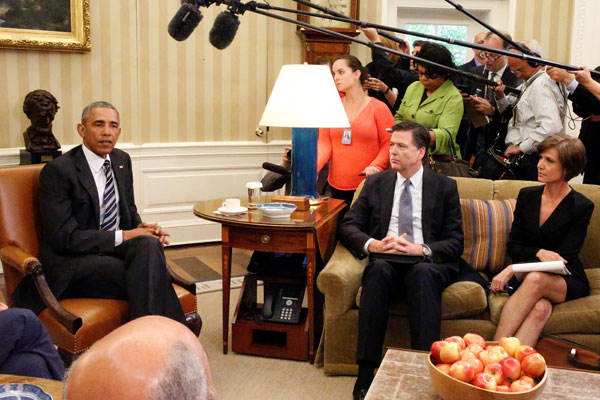
|
US President Barack Obama attends a meeting with FBI Director James Comey (C), Deputy Attorney General Sally Yates (R) along with DHS Secretary Charles Johnson (not pictured) and NCTC Director Nicholas Rasmussen (not pictured) at the Oval Office of the White House in Washington, US, June 13, 2016.[Photo/Agencies] |
WASHINGTON – US President Donald Trump fired the federal government’s top lawyer Sally Yates on Monday after she took the extraordinarily rare step of defying the White House and refused to defend new travel restrictions targeting seven Muslim-majority nations.
Yates said late on Monday that the Justice Department would not defend in court Trump’s directive that put a 120-day hold on allowing refugees into the country, an indefinite ban on refugees from Syria and a 90-day bar on citizens from Iran, Iraq, Libya, Somalia, Sudan, Syria and Yemen.
Yates said she did not believe defending the order would be “consistent with this institution’s solemn obligation to always seek justice and stand for what is right.”
Hours later, she was fired. The White House said Yates “has betrayed the Department of Justice by refusing to enforce a legal order designed to protect the citizens of the United States” and portrayed her actions as political.
Trump has argued tougher vetting of immigrants is needed to protect America from terror attacks but critics complain that his order unfairly singles out Muslims and defiles America’s historic reputation as a welcoming place for immigrants.
Yates, an appointee of former Democratic President Barack Obama, was days away from being replaced by Trump’s pick for the top spot at the Justice Department, Republican Senator Jeff Sessions, who is awaiting Senate confirmation.
“Ms. Yates is an Obama Administration appointee who is weak on borders and very weak on illegal immigration,” the White House said in a statement.
The White House said that Dana Boente, US Attorney for the Eastern District of Virginia, would be acting US attorney general until Sessions is approved.
Boente said in an interview with the Washington Post that he would enforce the immigration order.
There have been only a handful of instances in US history of top Justice Department officials publicly breaking with the White House.
The most famous example was in 1973, when then-Attorney General Elliot Richardson and his deputy resigned rather than obey President Richard Nixon’s order to fire a special prosecutor investigating the Watergate scandal.
The incident, which became known as the ‘Saturday Night Massacre,’ was a public relations disaster and is seen as a turning point in Nixon’s administration.
COURT ACTION LOOMS
US stocks suffered their biggest drop of 2017 on Monday as investors took the curb on immigration as a reminder that not all the new president’s policies would be market-friendly.
Chaos broke out over the weekend as border and customs officials struggled to put the order into practice amid loud protests at major US airports. Federal judges blocked deportation of those detained under the order.
An internal Department of Homeland Security document seen by Reuters showed 348 visa holders were kept from boarding US-bound flights this week, and more than 200 people came to the United States but were denied entry.
More than 735 people were pulled aside for questioning by US Customs and Border Protection officers in airports, including 394 green card holders, who are legal permanent residents of the United States, the document said.
Trump’s order was developed hastily and was not extensively reviewed by the agencies which are now grappling with implementing it. Trump’s administration is granting waivers from the refugee ban to allow 872 people into the country this week – refugees that had already been cleared for resettlement in the United States and were in transit when the order came out.
The Council on American-Islamic Relations, the country’s biggest Muslim advocacy group, filed a federal lawsuit on behalf of more than 20 people on Monday.
Several Democratic state attorneys general, including those from California and New York, have said they are considering whether to take legal action against the order.
Washington state will be the first. “It is an insult and a danger to all of the people of the state of Washington, of all faiths,” Governor Jay Inslee, a Democrat, told reporters.
Washington state Attorney General Bob Ferguson said the lawsuit would include constitutional claims, including allegations that Trump’s order violates the equal protection clause and the First Amendment.
Those arguments are also being used in other lawsuits filed over the weekend on behalf of individuals detained at US airports.
Technology companies Amazon.com Inc and Expedia Inc , both of which are based in Washington state’s Seattle area, will support the state’s suit, Ferguson said.
Another Washington state company, Microsoft Corp, said it has been cooperating with the attorney general’s office to provide information about the order’s impact “in order to be supportive.”
Other companies also went public with concerns, including the chief executives of Goldman Sachs Group Inc and Ford Motor Co.
CHORUS OF CONDEMNATION
Democratic lawmakers introduced legislation on Monday seeking to block Trump’s order, but the measures were unlikely to advance without support from Trump’s fellow Republicans, who control majorities in both houses of Congress and have largely expressed support for his actions.
Former President Obama took the rare step of weighing in, saying through a spokesman that he was heartened by the political activism on the issue.
But White House spokesman Sean Spicer argued Trump’s move was popular with Americans who are worried about attacks.
On Twitter, Trump downplayed the number of people who were affected at airports. He appeared to blame the airport confusion on protesters as well as on New York Senator Chuck Schumer, who teared up over the weekend while discussing the ban, and even a computer system failure at Delta Air Lines Inc late on Sunday.
US officials said the State Department received multiple cables from US embassies over the weekend reporting foreign dissatisfaction at the order.
Officials from the department circulated a draft memo of dissent, saying Trump’s move would hurt America’s image abroad and inflame anti-American sentiment.
The Iraqi parliament voted to ask the country’s government to retaliate against the United States, putting at risk cooperation in the fight against Islamic State.
A government official in Baghdad said Foreign Minister Ibrahim al-Jaafari plans to meet the US ambassador soon to express dismay at Trump’s decision.
British Foreign Secretary Boris Johnson joined a chorus of concern expressed by US allies, ranging from Iraq to Germany.
“This is, of course, a highly controversial policy, which has caused unease and, I repeat, this is not an approach that this government would take,” Johnson told parliament.


